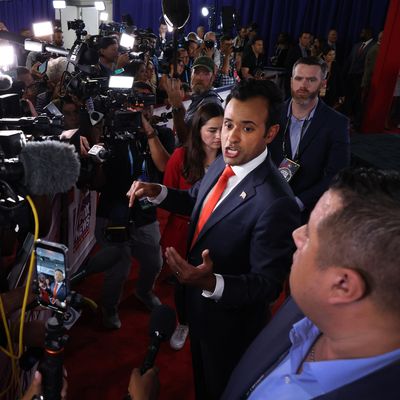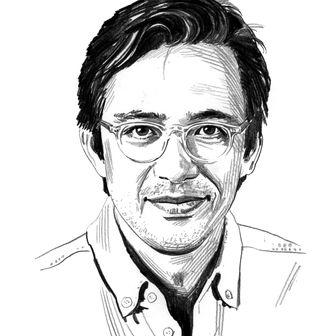
During one of several explosive exchanges between Vivek Ramaswamy and his Republican opponents in the first debate of the 2024 presidential-primary season, former New Jersey governor Chris Christie called Ramaswamy an “amateur” who “sounds like Chat GPT.” Ramaswamy met this volley, as well as a cascading chorus of whoops and laughter and “oohs” from the crowd, with an impervious smile and a barb about Christie literally embracing Barack Obama after Hurricane Sandy. The shield of his smile had to be deployed all night long, as his rivals took obvious umbrage at the presence of this rude political neophyte and attacked him with relish — an uncanny replay of the dynamic that governed Donald Trump’s debates in 2016. But nothing could dampen Ramaswamy’s spirit or dim that grin. To borrow a line from FDR, Ramaswamy seemed to be saying to his rivals that he welcomed their hatred.
Ramaswamy, a wealthy entrepreneur who muscled and hustled his way from obscurity onto a debate stage that notably did not include the race’s front-runner, Trump, is adept at borrowing lines. Christie’s jab was in part a reference to his robotic, rat-a-tat delivery of aphorisms that resemble a cross between traditional conservative know-nothingism and Elon Musk’s brand of Silicon Valley know-everythingism. (“Fossil fuels are a requirement for human prosperity!”) But Christie was also calling out Ramaswamy’s naked appropriation of one of Obama’s most famous quotes from the 2008 campaign, with Ramaswamy introducing himself to the Republican faithful in Milwaukee as a “skinny guy with a funny last name.” His crisp hand gestures and tight little head shakes were vintage Obama, yet the words coming out of his mouth were “Reverse racism is racism.” It really did feel like Ramaswamy was a computer program trawling the past two decades of American history to cobble together a ruthless striver’s idea of a political persona, some unholy amalgamation of Obama, Trump, and Musk.
The press has been about as hostile to Ramaswamy as the rest of the Republican field. In a New York Times roundtable after the debate, commentators from across the ideological spectrum described him as “astoundingly arrogant,” “irritating,” “glib,” “smarmy,” “obnoxious,” “a zero,” “preening,” and “completely bananas.” The conservative columnist Bret Stephens said Ramaswamy “seems to think he’s Jesus,” and not in the meek-shall-inherit-the-Earth way. There is a sense in the Establishment media that because Ramaswamy is such a copycat, particularly of Trump, that he represents no broader threat or significance, that he’s just another wannabe swimming in the MAGA slipstream. The Princeton historian Kevin Kruse tweeted, “What’s funny is that Vivek is going to campaign with furious Debate Bro energy for six nonstop months and then Trump will casually refer to him as ‘Rama-smarmy, or whatever’ and he’ll immediately turn to dust.”
But I would posit that perhaps Ramaswamy signifies something more. If you are a youngish person looking to get into politics or some other career of public renown, it’s only natural that you would model yourself on the people in your lifetime who have had ostentatious success in those areas, people like Obama and Trump and Musk. It seems likely that, in the future, we will see a lot more politicians like Vivek Ramaswamy.
Ramaswamy’s youth is important, as American democracy slides into gerontocracy. So is the context of the debate, where you could see this lithe figure with taut skin and a full head of not-gray hair antagonize and fluster the leathery dinosaurs that, if the polls are to be believed, he is already eclipsing. Ramaswamy flaunted his age at every turn, beginning his closing statement with a huge flex: “I was born in 1985” — which makes him the youngest presidential aspirant of my own lifetime, indeed one who is several years younger than me, a horrific personal milestone for which I will never forgive him. His liveliness irked his opponents as well, particularly former vice-president Mike Pence, who showed his irrepressible counterpart nothing but disdain in what read to me as the way Pence would talk to Trump if Trump had less power. “We don’t need to bring in a rookie,” Pence scoffed.
In response, Ramaswamy took great joy in exploiting Pence’s age and experience, which came through in Pence’s delivery (the long statesman’s pause), his appearance (Ken doll whose smooth plastic veneer has gone a bit sludge-y), and constant references to the old deities of the Republican Party (God and Ronald Reagan). “Some others like you might have a ‘Morning in America’ speech,” Ramaswamy told Pence. “But it is not morning in America. We live in a dark moment.” When the discussion turned to the war in Ukraine, which saw Rawaswamy taking passionate fire from all sides for his opposition to additional U.S. aid for the Ukrainians, he said to Pence, “I have a news flash: The U.S.S.R. does not exist anymore.” He was intent on drawing a line in the sand between ancient history and the boundless future. And in doing so, he happily smashed the Republican Party’s idols as Trump had done before him, the jeers raining down on him for his anti-war stance reminiscent of the stern admonitions Trump received in 2016 for saying the Iraq War was a mistake. Though if Trump was a flattening bulldozer, Ramaswamy was nimbler, more precise — a guided missile.
He could also perform the equivalent of wading into a brawl and inviting all comers, calling his rivals “super-PAC puppets” and declaring, “I’m the only person on this stage who isn’t bought and paid for,” an audacious line that drew a scandalized “Whoa whoa whoa” and “That’s ridiculous” from people who very much are bought and paid for. In the melee over the Ukraine war, he turned to former South Carolina governor Nikki Haley, a hawk, and said, “Nikki, I wish you well on your future career on the boards of Lockheed and Raytheon,” a rebuke so impolite and so close to home that Haley was left red-faced and sputtering. In appreciating and even admiring Ramaswamy’s sheer disrespect for his fellow Republicans, I realize I am falling into the same trap that ensnared so many liberal journalists the last time this happened, when Trump seemed so attractive because he was demolishing politicians I also wanted to see demolished.
Still, the appeal of the iconoclast remains, and Ramaswamy’s primary influences, the Ur-trolls Trump and Musk, let it be known that game recognizes game. “Vivek is increasingly compelling,” Musk tweeted during the debate. “This answer gave Vivek Ramaswamy a big WIN in the debate because of a thing called TRUTH,” Trump posted on Truth Social, referring to Ramaswamy’s claim that Trump was the “best president of the 21st century.” Obama has not deigned to comment on a politician who is destined to be a member of Trump’s entourage, and maybe even a partner on his presidential ticket, but Obama’s influence on Ramaswamy is fascinating, a sprinkling of a feel-good, only-in-America story on an otherwise tiresome recapitulation of Trump’s “American carnage” speech. Obama, too, exhibited a preternatural confidence that his critics described as “arrogant,” “obnoxious,” “preening,” and worse; Obama, too, reveled in his relative youth, swishing three-pointers on the campaign trail and jogging up the steps to Air Force One; Obama, too, played the insider-outsider sweeping away the fossilized vestiges of an older era.
It’s unclear whether Ramaswamy’s policy positions, such as they are — “The climate change agenda is a hoax!” — will have much lasting appeal in American politics. But surely his style, no matter how much it may grate on the ears and annoy finer sensibilities, is on the ascendance. No longer will politicians be as slow, as pious, as patriotic as Mike Pence, who came of age in the pre-Trump world; they’ll be quick to let the insults fly, fearless in their misguided convictions, and scornful of their elders and betters. To believe otherwise is to believe that Trump, especially, is a one-off phenomenon, that we will one day return to having a slate of “normal” candidates running to be the Republican nominee for president, when so many incentives point in the other direction: toward politicians who are younger, hungrier, meaner, wilder.






























